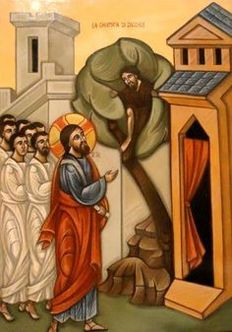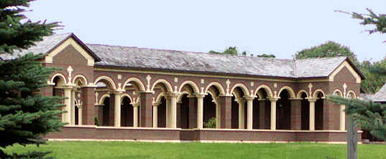Designate and maintain a solitary place.

God said to Elijah, “Go outside and stand on the mountain before the LORD; the LORD will be passing by . . .” and when he heard a tiny whispering sound, “Elijah hid his face in his cloak and went and stood at the entrance to the cave.”
If there is one thing that we can say is unique to the Carmelite way of life and essential to this particular way of life in allegiance to Christ, it is the practice and time spent in solitude and silence. It is not, as some may be confused and believe, the meditative silence we seek in order to calm the soul and give respite from an increasingly loud and noisy world; nor is it merely an inner calm and inner silence that we seek while commuting on the train each morning, surrounded by the din of factory machinery or the bustle of demanding customers and clients; rather, it is in the silence and intimacy of solitude that we find God, that we come face-to-face with our Creator without distraction and we stand before Him as a dear friend, His attention raptured on us, just as we are enraptured by Him; it was in that very moment as Elijah hid in the cave that he encountered the One he loved, that he heard the tiny whisper of his lover’s call, once drowned by the sound of a roaring wind, buried under the rumble of an earthquake and overwhelmed by raging fire. In the stillness, the loneliness--a truly holy loneliness--and solitude that was free from all other voices, from distractions and chatter of day-to-day concerns, Elijah’s ears were free to hear and listen to no other but the LORD alone. And so, at the sound of his lover’s call, he approached to the mouth of the cave with timidity and gentleness.
It was not fear that hid his face and inspired Elijah to raise his cloak--if we recall, he had already passed the high winds, the earthquake and fire without the slightest tremble. This was the prophet’s first meeting with the LORD. He had prayed and spoken, and been zealous in fulfilling all of the LORD’s commands, but not yet had they met face-to-face, not yet had he stood so barren and open before the one he loved. As a bride may hide behind her hands on her wedding night, or a groom timidly reach his hand forward that first time, Elijah hid his face, shielding his eyes from his beloved, from the overwhelming intimacy that threatens to drown our soul yet gives us great life.
Life in Carmel has always sought to imitate and share in the experience of Elijah. From the very beginning, it is why the first monks gathered around the Spring of Elijah--there was already a small group of eastern hermits gathered around his cave--why they took up residence in solitary caves far from the noise and distractions of the holy city, it is why they dedicated their lives to prayer and silence, and why centuries later, as they moved into cities and new regions, they continued to call their homes monasteries.
It is true that there are an infinite number of ways that God presents Himself to us; that He dwells in every quarter of the globe and even in the most vile and loudest of places imaginable; that He does not exist alone in the silence and solitude, but is in the work of healing others, in our liturgical prayers, in the studying of His Word, the preaching and evangelization of the Gospel, in missionary work to the poorer regions, in the work of social justice, in the care of the impoverished and the dyeing, in the teaching of school children, in the raising of a family and the sacrifice of service to others; God is in the richness of nature and the congestion of cities; He exists everywhere and will reveal Himself in whatever way we may either see Him most clearly or in the ways that He needs for us to see according to the Good of His Kingdom. That God exists in such places, and why humanity has discovered Him here, is why Albert recognized that “many and varied are the ways,” and that there are many orders with many charisms and ways in living a life in allegiance to Christ--the Carmelite way is one among them.
Yet, it is also true that while God exists everywhere, we are not capable of seeing Him everywhere and equally. Just as it may be harder for us to have a conversation with a good friend in a crowded room, or in the middle of a rock concert, or while we are shopping for things, or having to focus our attention at our job, or carryout any one of our daily chores in life, it is harder for us to have that intimate conversation with God in the midst of the very same things. And truly, it is this friendship that we are seeking: that Elijah approached as with a lover and dear friend. God wants to share and be with us as such a dear friend. It is only in the silence and solitude that we can experience God in these particular and certain ways. Just as it is easy for us to know that time alone together is essential to any relationship: with our spouse, our children, our family and our friends, so too is this time alone, which is in solitude, essential to our relationship with Christ and our Lord. It is in solitude that we are attuned more to the sound of the Spirit and Wisdom, that we may also be more attentive and her Her more often throughout the rest of day; it is in solitude that we grow in friendship and experience more intimate love; and it is in solitude that we receive the healing Grace of His presence and Spirit. We are rejuvenated in the spirit, receiving healing for whatever may ail our spirit, we receive from His energizing bounty and just as Elijah grew in strength and was prepared for a new journey and mission, so to does anyone who stands for any time in such presence with God, reap from the fruit of His Spirit and Grace.
Designate a time and place for daily solitude. Anyone, regardless of your station or condition in life, can do this, even if it is for a short time and may be difficult to find such a reserved place. I read of the story of a priest, held in the Russian gulags for over 20 years, who intentionally seized upon every moment of solitude he could find--even if it was for 10 seconds when he was the first to sit at the table for lunch, or if he had a moment of privacy in the latrine. It is advantageous, if at all possible, that you have times and places that remain regular and the same. This routine is part of our human psyche, that we benefit from such consistency, but even more importantly, that we have taken the step to reserve such time and places for our Lord; that we have set them aside for Him and for thoughts of Him alone. This reservation is another dimension of solitude that we may not often think of. In addition to physical solitude, there is a solitude, or freedom of distraction from our thoughts. Being is our office, it is easier to think of things about work and appointments that may be coming later in the day; in our bedrooms we may be distracted by an overflowing laundry hamper, or our make-up table, or thoughts of cutting our time short and going to bed. If possible, find a place that helps to inspire thoughts of God alone, or a place where you are able to clear your mind from any thoughts or distractions. Spend your time, perhaps five minutes in the beginning, that is at least twice each day, if possible, and increase this time to a half-hour, or even an hour each time as it is possible and not unduly burdensome to your life and commitments to others--we should not use the excuse of prayer to bring harm or neglect the needs of others. If you are a parent, you may be able to consider inviting and sharing time in silence with your child, possibly for a short time at the dinner table, or immediately prior to bed, knowing what is suitable to their age and that only a minute may be appropriate. Be also attentive to other times and stresses, that whenever your spirit is in need, seek God in the silence. You will surely find that if you do this, or even if you ignore this need for even a short time, that the rest of this life hinges on and is nourished by such silence.
If there is one thing that we can say is unique to the Carmelite way of life and essential to this particular way of life in allegiance to Christ, it is the practice and time spent in solitude and silence. It is not, as some may be confused and believe, the meditative silence we seek in order to calm the soul and give respite from an increasingly loud and noisy world; nor is it merely an inner calm and inner silence that we seek while commuting on the train each morning, surrounded by the din of factory machinery or the bustle of demanding customers and clients; rather, it is in the silence and intimacy of solitude that we find God, that we come face-to-face with our Creator without distraction and we stand before Him as a dear friend, His attention raptured on us, just as we are enraptured by Him; it was in that very moment as Elijah hid in the cave that he encountered the One he loved, that he heard the tiny whisper of his lover’s call, once drowned by the sound of a roaring wind, buried under the rumble of an earthquake and overwhelmed by raging fire. In the stillness, the loneliness--a truly holy loneliness--and solitude that was free from all other voices, from distractions and chatter of day-to-day concerns, Elijah’s ears were free to hear and listen to no other but the LORD alone. And so, at the sound of his lover’s call, he approached to the mouth of the cave with timidity and gentleness.
It was not fear that hid his face and inspired Elijah to raise his cloak--if we recall, he had already passed the high winds, the earthquake and fire without the slightest tremble. This was the prophet’s first meeting with the LORD. He had prayed and spoken, and been zealous in fulfilling all of the LORD’s commands, but not yet had they met face-to-face, not yet had he stood so barren and open before the one he loved. As a bride may hide behind her hands on her wedding night, or a groom timidly reach his hand forward that first time, Elijah hid his face, shielding his eyes from his beloved, from the overwhelming intimacy that threatens to drown our soul yet gives us great life.
Life in Carmel has always sought to imitate and share in the experience of Elijah. From the very beginning, it is why the first monks gathered around the Spring of Elijah--there was already a small group of eastern hermits gathered around his cave--why they took up residence in solitary caves far from the noise and distractions of the holy city, it is why they dedicated their lives to prayer and silence, and why centuries later, as they moved into cities and new regions, they continued to call their homes monasteries.
It is true that there are an infinite number of ways that God presents Himself to us; that He dwells in every quarter of the globe and even in the most vile and loudest of places imaginable; that He does not exist alone in the silence and solitude, but is in the work of healing others, in our liturgical prayers, in the studying of His Word, the preaching and evangelization of the Gospel, in missionary work to the poorer regions, in the work of social justice, in the care of the impoverished and the dyeing, in the teaching of school children, in the raising of a family and the sacrifice of service to others; God is in the richness of nature and the congestion of cities; He exists everywhere and will reveal Himself in whatever way we may either see Him most clearly or in the ways that He needs for us to see according to the Good of His Kingdom. That God exists in such places, and why humanity has discovered Him here, is why Albert recognized that “many and varied are the ways,” and that there are many orders with many charisms and ways in living a life in allegiance to Christ--the Carmelite way is one among them.
Yet, it is also true that while God exists everywhere, we are not capable of seeing Him everywhere and equally. Just as it may be harder for us to have a conversation with a good friend in a crowded room, or in the middle of a rock concert, or while we are shopping for things, or having to focus our attention at our job, or carryout any one of our daily chores in life, it is harder for us to have that intimate conversation with God in the midst of the very same things. And truly, it is this friendship that we are seeking: that Elijah approached as with a lover and dear friend. God wants to share and be with us as such a dear friend. It is only in the silence and solitude that we can experience God in these particular and certain ways. Just as it is easy for us to know that time alone together is essential to any relationship: with our spouse, our children, our family and our friends, so too is this time alone, which is in solitude, essential to our relationship with Christ and our Lord. It is in solitude that we are attuned more to the sound of the Spirit and Wisdom, that we may also be more attentive and her Her more often throughout the rest of day; it is in solitude that we grow in friendship and experience more intimate love; and it is in solitude that we receive the healing Grace of His presence and Spirit. We are rejuvenated in the spirit, receiving healing for whatever may ail our spirit, we receive from His energizing bounty and just as Elijah grew in strength and was prepared for a new journey and mission, so to does anyone who stands for any time in such presence with God, reap from the fruit of His Spirit and Grace.
Designate a time and place for daily solitude. Anyone, regardless of your station or condition in life, can do this, even if it is for a short time and may be difficult to find such a reserved place. I read of the story of a priest, held in the Russian gulags for over 20 years, who intentionally seized upon every moment of solitude he could find--even if it was for 10 seconds when he was the first to sit at the table for lunch, or if he had a moment of privacy in the latrine. It is advantageous, if at all possible, that you have times and places that remain regular and the same. This routine is part of our human psyche, that we benefit from such consistency, but even more importantly, that we have taken the step to reserve such time and places for our Lord; that we have set them aside for Him and for thoughts of Him alone. This reservation is another dimension of solitude that we may not often think of. In addition to physical solitude, there is a solitude, or freedom of distraction from our thoughts. Being is our office, it is easier to think of things about work and appointments that may be coming later in the day; in our bedrooms we may be distracted by an overflowing laundry hamper, or our make-up table, or thoughts of cutting our time short and going to bed. If possible, find a place that helps to inspire thoughts of God alone, or a place where you are able to clear your mind from any thoughts or distractions. Spend your time, perhaps five minutes in the beginning, that is at least twice each day, if possible, and increase this time to a half-hour, or even an hour each time as it is possible and not unduly burdensome to your life and commitments to others--we should not use the excuse of prayer to bring harm or neglect the needs of others. If you are a parent, you may be able to consider inviting and sharing time in silence with your child, possibly for a short time at the dinner table, or immediately prior to bed, knowing what is suitable to their age and that only a minute may be appropriate. Be also attentive to other times and stresses, that whenever your spirit is in need, seek God in the silence. You will surely find that if you do this, or even if you ignore this need for even a short time, that the rest of this life hinges on and is nourished by such silence.




 RSS Feed
RSS Feed